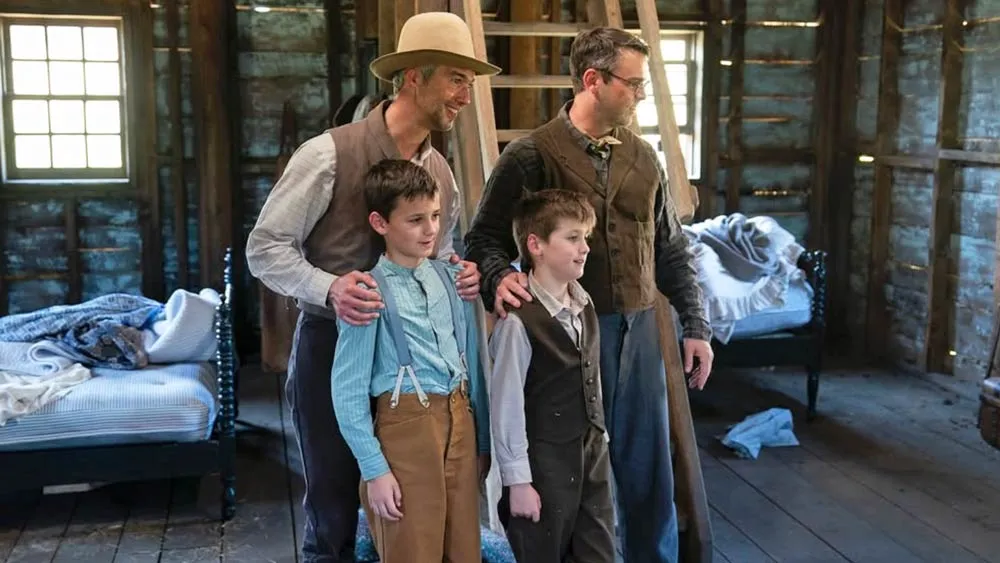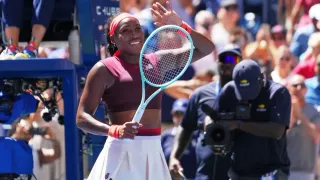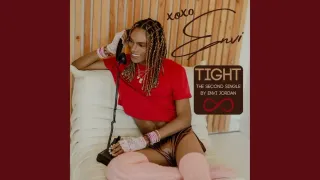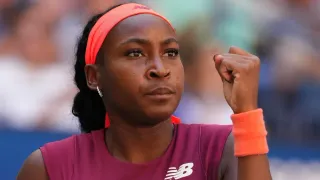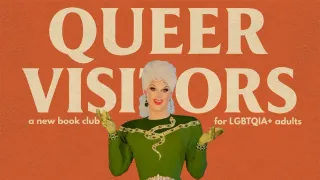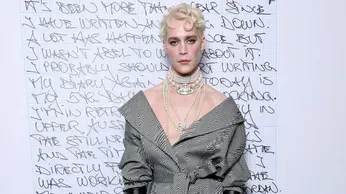
Jun 16
EDGE Interview: Micah McLaurin is Redefining Pop on His Own Terms
Ryan Reichard READ TIME: 7 MIN.
Micah McLaurin is redefining pop with his own signature sound that blends his classical roots with a club-ready edge. Once living in New York, the musician and singer found his voice in song before further expressing himself through fashion. Now, McLaurin collaborates with some of the biggest producers in music and performs in front of thousands.
McLaurin scored a recent club smash with his song "Baboom," which soared up the charts and became an international hit where it peaked at the top of Music Week's Pop Club chart and Hypeddit's Top 100 100 Downloads Progressive House Chart.
Now, he has released his song "Satisfied" right in time for Pride Month. The song is a euphoric 90s house-infused anthem produced by Ferando Garibay and co-written with Simon Wilcox, both of whom have worked with some of the biggest names in music including Lady Gaga and Carly Rae Jepsen. To amp things up, "Satisfied" has now been remixed by Until Dawn, available now.
Over the course of his career, McLaurin has been acclaimed by such outlets as Rolling Stone and Vanity Fair. He's now taking on Chicago Pride to showcase his commitment to queer culture through music and if that was not enough, the singer also teased more new music on the way.
From Charleston, South Carolina to the big stages, McLaurin's journey is a testament to fearless artistry and self-acceptance. Find out what he had to say about his single "Satisfied" as well as his upcoming events and even new music.
EDGE: You started out as a concert pianist. What inspired your shift from classical to pop music?
Micah McLaurin: I think it was a long time in the making because I grew up conservative. I was raised in South Carolina in a Catholic family and surrounded by classical music. I loved classical music, yes, but it also follows traditions and rules - it fits within that rigid structure.
The shift to pop came after I left the conservatory - the Curtis Institute in Philadelphia, which was amazing - and later Juilliard, where I did my master's. When I lived in New York, I started to discover life outside of classical music and realized there was a whole world I wasn't familiar with. I went to dance parties and heard a lot of great music, like ABBA, which I've loved since a young age.
I became curious and started taking harmony lessons, exploring different genres. I began arranging pop songs on the piano and writing a little bit. Eventually, I realized I wanted to create music that was truly my own - that I was the author of. That's what led to my transition to pop.
EDGE: Do you think your classical background has shaped your more pop-oriented sound?
Micah McLaurin: Definitely. Classical music is the foundation of everything - it's the foundation of jazz, of pop. Because of my classical training, I feel like I have the tools to do anything I want musically.
EDGE: Your story includes elements of embracing yourself, and that theme seems to spill over into your music. How do you think your music reflects your journey of self-liberation?
Micah McLaurin: Most of the music I've written so far has been about freeing myself from the constraints I grew up with - constraints I still feel are a part of me. Writing is cathartic; it allows me to process my experiences, whether I call them trauma or simply hardship. We've all faced difficulties, and turning pain into something celebratory is really powerful.
EDGE: Speaking of liberation, your new single "Satisfied" is out now - a sleek, 90s house-inspired anthem. What drew you to this particular sound, and how did the creative process unfold with Simon Wilcox and Fernando Garibay?
Micah McLaurin: When I moved to New York, I discovered the city's nightlife, especially the gay scene, which has an amazing party culture. I started listening to dance music - Madonna, Lady Gaga, Cher, Donna Summer, disco and 90s house.
I fell in love with it because it's so musical, but the dance element brings it to another level - it gives you butterflies when you hear it. That's what inspired "Satisfied" - its sound really stems from the history of dance music.
EDGE: What's one thing you've learned from collaborating with Simon and Fernando?
Micah McLaurin: They are incredible at what they do. Because they've been in the industry for so long and have put in the work, I'm amazed at how quickly they come up with ideas - it's second nature to them.
EDGE: That's important, especially in the music industry. It almost has to be instinctive - like breathing - to create something authentic. Wouldn't you agree?
Micah McLaurin: Oh, totally! To truly be a musician, you have to be so possessed by it that you can't imagine doing anything else. It's a hard path, and you have to be passionate, engaged, and completely in love with what you're creating.
EDGE: You're releasing a remix of "Satisfied" this Pride Month and performing at several Pride events. What does Pride mean to you, both personally and artistically?
Micah McLaurin: That's a big question. The obvious answer is being proud of who you are, but for me, it's also about reclaiming power.
We've all faced insults, rejection and people telling us we're going to hell. Pride is about reversing that negativity and turning it into something empowering - owning who you are instead of feeling ashamed.
EDGE: How do you plan to bring "Satisfied" to these Pride events, and what role will it play in your set?
Micah McLaurin: I'm performing at Chicago Pride, where I'll sing "Satisfied" along with a few other songs. There's a remix out now by Until Dawn - it's very disco, very house. I hope it gets played in the clubs because it's perfect for the season.
I think "Satisfied" fits Pride because it's fun, energetic, and a bit hedonistic. Conservatives often accuse queer people of being hedonistic and pleasure-seeking, but honestly, what's wrong with that? Why shouldn't people enjoy life, love, and their sexuality? Why shouldn't they dream big and say, "Yes, I want to have a castle"?
EDGE: You've performed in small clubs and on big stages like Chicago Pride. How do these experiences compare? Do you prefer one over the other?
Micah McLaurin: I wouldn't say I prefer one over the other. Since I started performing at age nine, I've always treated every show as equally important - whether for ten people or ten thousand.
Some of my favorite performances have been in intimate settings, like someone's living room. Others have been extravagant, like Dolce & Gabbana's event, which left me buzzing for months.
I love small clubs because they're part of the community, and they feel more low-risk - there's a certain freedom in that. But big stages have their own magic too.
EDGE: Your "Satisfied" music video was styled by Brian Conway and shot at a stunning château. Can you talk about the visual storytelling and what it reveals about your inner world?
Micah McLaurin: The château - yes. I feel like the châteaux in this theme I'm exploring stem from my classical training. I attended a summer program for four weeks at the Château de Fontainebleau in France. I performed in that glorious setting - it's like Versailles - and had lessons and classes there.
For "Satisfied", I didn't want the video to be overly sexual, even though the lyrics imply that. I wanted it to feel more like a fantasy, painting a picture of a life that seems unattainable - whatever your wildest dreams are. I wanted to permit that sense of fantasy in the video.
It's also about embodying different characters. I'm the only person in the video, but I'm not the same throughout - I shift between different expressions of myself. For example, when I go out, sometimes I dress very femininely, wearing platform heels and more traditionally feminine clothes. Other times, I dress more masculinely - just a T-shirt and jeans.
The video showcases how there can be different sides to a person, including in their self-expression and sexuality. That can come through in the way we dress and in different aspects of our personality. That's what I wanted to convey.
EDGE: When exploring different themes with clothing, is it your intention to use fashion as a way to amplify the message in your music?
Micah McLaurin: Music takes me to a different place - it gives me a physical reaction. I get chills, I want to cry or dance. Fashion does the same thing for me.
When I put on certain outfits, when I wear couture, I don't feel like my everyday self. I start to embody what I'm wearing - it gives me a feeling that's hard to describe. I just put it on, and I light up inside.
Fashion and music are connected in the way that all art is connected. Art should evoke emotion - it should create a reaction - and I don't think that's limited to just one form. As an artist, I want to express myself in multiple ways - not just through music, but also through fashion and visuals.
EDGE: How do you hope your music speaks to other queer artists or fans who are still finding their voice?
Micah McLaurin: I hope my music gives people permission to explore. My teachers discouraged me from experimenting with different styles of music and even from dressing the way I do.
When I was in conservatory, I'd wear a masculine button-down shirt with a few crystals on it, and one of my teachers questioned whether it was appropriate for classical music. That felt so limiting.
If there's one message I want people to take from my music, it's this - don't limit yourself.
EDGE: Outside of "Satisfied" you have an upcoming song called "Remember Me," which has more of a Latin influence. How would you tease fans about what they can expect from this new musical direction?
Micah McLaurin: I think it's not far off from "Satisfied." It feels more Latin because there's a guitar, but it's also inspired by '90s house. There's a dance break with rhythmic keyboards, and I repeat the phrase, "Remember me, remember me, remember me."
Structurally, it's similar to "Satisfied," but it has a different flavor - it's more trance-like, more dreamy. It's less in-your-face and more hypnotic. There's a slight Latin feel and some classical Spanish influences in the harmony, but at its core, it's still dance music.
EDGE: Outside of music and fashion, where would you ideally like to see yourself by the end of the year?
Micah McLaurin: Definitely performing more. I still want to create more music - I'm still writing. Traveling, too.
I'm eager to start performing my songs more, developing my sets, and shaping my live show. Eventually, I want to incorporate my piano into my performances more - creating a fusion between piano, pop, and fashion and making a full live experience out of it.
